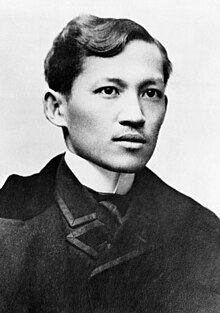Liberalism in the Philippines
This article or section is in a state of significant expansion or restructuring. You are welcome to assist in its construction by editing it as well. This template was placed by TheNuggeteer (talk · contribs). If this article or section has not been edited in several days, please remove this template. If you are the editor who added this template and you are actively editing, please be sure to replace this template with {{in use}} during the active editing session. Click on the link for template parameters to use.
This article was last edited by TheNuggeteer (talk | contribs) 4 seconds ago. (Update timer) |
| Part of a series on |
| Liberalism |
|---|
 |
Liberalism in the Philippines emerged during the Philippine Revolution, when Filipino revolutionary José Rizal hinted liberalism in his works.[1] The ideology emerged more during the creation of the Liberal Party of the Philippines, one of the oldest parties in the Philippines. The ideology slowly died out during the 2000s, with the rule of Rodrigo Duterte and other outside ideologies, including Authoritarianism and Populism. The ideology currently sits in a low position, submerged by other popular ideologies.[2]
History
[edit]Spanish tenure
[edit]A Filipino named Luis Rodríguez-Varela, or "El Conde Filipino" published books popularizing and defensing the Liberalist ideology. Many of his ideologies reached liberal families, especially in Manila, the popularization and emergence later took part in the creation of the Comite de Reformadores of 1869, the first Liberal Party. The party included various people, including Father José Burgos. The party also had a youth wing in the University of Santo Tomas, including people such as Felipe Buencamino and Paciano Rizal. The party later ended by government suppression in the 1872 Cavite mutiny.[1] After, Nationalism in the Philippines was founded on Liberalism, creating the first generation of Nationalists, Ilustrados. Including the Filipino revolutionary Jose Rizal.[3] This type of liberalism surrounded a group from Spain known as the "Propaganda Movement".
The Philippine Revolution
[edit]
During the Spanish tenure, Filipino revolutionary José Rizal hinted multiple references to the Liberalist ideology, while critics like Renato Constantino and Jose Maria Sison hinted to Rizal as radical. Liberalism was mostly used during the Philippine revolution, after other international revolutions including the American Revolution and the French Revolution. In the novel Noli Me Tángere, a nationalist figure is seen named Elias, which is an important character in the novel. Elias's ideologies include Radicalism and Liberalism, therefore popularizing the ideology even more.[1]
American tenure
[edit]During the American tenure, Liberalism became the main ideology, helping state-building. Compared to the prominence in Filipino politics, the ideology never catched on to society, while the leaders saw themselves as Liberal, the rest of the country did not.[3] The ideology of liberalism increased when the idea of de-colonization from the Americans was introduced.[2]
Martial law
[edit]The first challenge of Filipino liberalism was the rule of the former president and dictator Ferdinand Marcos. He stated that his actions constituted a “democratic revolution from the center". His rule also fought against the Marxism–Leninism ideology and Oligarchic families. The Liberal Party later became the main opposition of the Marcos regime. A revolution, named the People Power Revolution, threw down the Marcos regime and set a Liberal, Corazon Aquino, as president. The revolution itself was considered Liberalist.[3]
Duterte regime
[edit]During the 2016 Philippine presidential election, two favored candidates were foreseen, Liberalist Grace Poe and Populist Rodrigo Duterte. The election eventually ended, placing Duterte as president. The regime, also known as "Dutertemismo", was opposed by Liberalists and priests. The regime was also opposed following allegations of mass murder.[3] Sources also say that Duterte criticized the Liberalist ideology, and disrespecting the press.[4]
References
[edit]- ^ a b c "Jose Rizal: The Radical Liberal" (PDF).
- ^ a b Claudio, Lisandro E. (2017-03-24). Liberalism and the Postcolony: Thinking the State in 20th-Century Philippines. NUS Press. ISBN 978-981-4722-52-0.
- ^ a b c d "The Erosion of Liberalism and the Rise of Duterte in the Philippines". Retrieved 5 August 2024.
{{cite web}}: line feed character in|title=at position 53 (help) - ^ "Oscillating between populism and liberalism in the Philippines: participatory education's role in addressing stubborn inequalities". Retrieved 6 August 2024.
